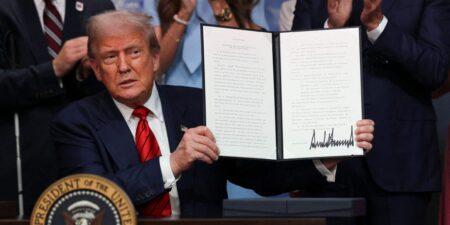You can probably guess the type of day Lip-Bu Tan might be having.
President Donald Trump took to social media Thursday to urge the Intel CEO to resign, after a Republican senator raised concerns about Tan’s reported holdings in Chinese companies.
Of all the challenges that CEOs, university presidents, and other leaders have to manage during the second Trump administration, drawing ire from the White House might be one of the most disconcerting.
Intel has yet to issue a public statement regarding Trump’s call for Tan’s resignation. Business Insider spoke to crisis-communications practitioners to get their take on what leaders at Intel and beyond could do next. Here are four pieces of advice:
Move swiftly
Kevin Donahue, a 30-year veteran of crisis comms, told Business Insider that Intel needs to get its message out on multiple fronts. Otherwise, he said, the chipmaker risks having the crisis grow.
“It’s potentially fatal,” Donahue said. “You absolutely cannot stay mum in situations like this.”
He added that beyond issuing a statement, the company’s considerations need to include investors, customers, employees, and other elected officials. Intel also needs to game out various scenarios about what could happen next and how the story will play out on social media, where the tempest intensified Thursday following Trump’s morning post on Truth Social.
“The CEO of INTEL is highly CONFLICTED and must resign, immediately. There is no other solution to this problem,” Trump wrote shortly after 7:30 a.m.
Intel shares dropped more than 3% in afternoon trading. Intel didn’t immediately respond to a request for comment from Business Insider on Trump’s statement.
Tan isn’t the first leader Trump has criticized, but it is rare for the President to explicitly call for a CEO’s resignation. He has, however, taken on the heads of major US law firms, university presidents, and Federal Reserve chairman Jerome Powell in an effort to bring to heel institutions he believes don’t align with his aims.
“President Trump remains fully committed to safeguarding our country’s national and economic security,” said a White House official in a statement to Business Insider. “This includes ensuring that iconic American companies in cutting-edge sectors are led by men and women who Americans can trust.”
Draw a line in the sand
Michele Ehrhart, who has worked in crisis comms for more than a decade and was VP of global communications at FedEx, told Business Insider that Intel needs to decide whether it’s going to stand behind Tan. Once that decision is made, she said, the company should issue a statement explaining why it’s doing so.
“You have to really draw a line in the sand on what it is you’re trying to accomplish and how you’re planning to do that,” said Ehrhart, who is the author of the book “Crisis Compass.”
She said that could include putting a strong surrogate or, ideally, Tan himself, in front of a media outlet.
“That’s what the CEO is there to do,” Ehrhart said. “They’re your most important spokesperson.”
At the same time, she said, it’s possible to say too much and risk giving new life to the story. Ehrhart suggests an approach of, “Here’s our statement. We’re not going to go beyond it.”
Form a team
Donahue said that Intel should create a team comprised of the company’s legal, government affairs, and PR departments, among others, to coordinate a response.
Essentially, he said, the company needs to convince its stakeholders that the company and its board did their due diligence before they hired Tan in March, that they’re supportive of him, and that any investments he might have don’t present national security risks.
“That’s a tall order,” said Donahue, who is senior managing director of the Business and Corporate Communications group at Coologee, which focuses on brand transformations.
Create an offramp
Evan Nierman, CEO of Red Banyan, a global crisis-communications firm, told Business Insider that there’s a fundamental difference between how a company would handle being called out another by a high-profile individual versus Trump.
In the case of Trump, it’s important to “create an offramp” by pulling “all of the levers of power that are available to you,” Nierman said. Engage with those around the president and convince him you want to be an ally, not an adversary, he said.
It might also make sense to appeal to what Nierman called Trump’s “transactional” nature. Comb through the president’s social-media posts and other statements to get a sense of what he might want to get him to back down, Nierman said.
With that approach, he said, “you’re going to have a lot more success than telling him no, ignoring him or trying to defend yourself.”
Read the full article here















